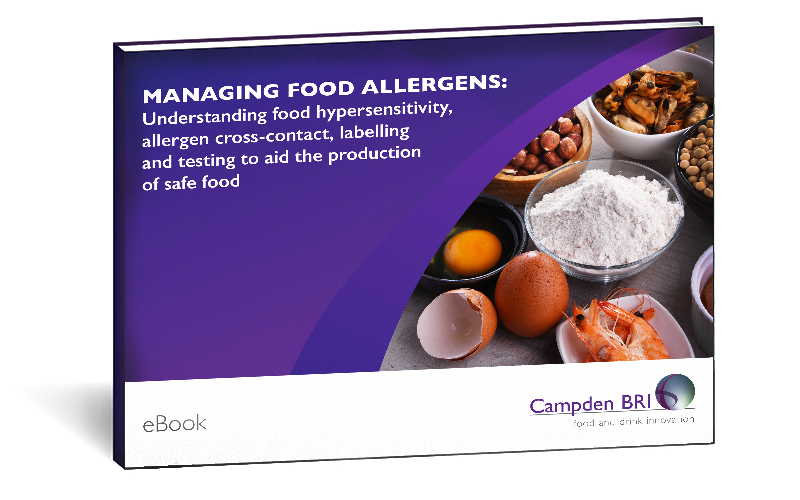
What you need to know about kiwifruit and other emerging elicitors of food allergy
30 September 2024 | Christopher James, Safety and Quality Specialist – Allergens
Food allergy affects 3-10% of adults and 8% of children globally. Food business operators (FBOs) must accurately label food products, or provide information, regarding food allergens to allow consumers to make safe choices about the food they consume, and to comply with legislation where applicable.
There are many foods that consumers can be allergic to that are outside of those listed as allergens in legislation in the UK/EU (i.e. those required to be communicated in food allergen information/labelling).
Kiwifruit offers one example of a food that consumers can be allergic to but that is not listed as an allergen in UK/EU legislation. Like for many crops, the use of kiwifruit is growing and changing across a range of food streams.
This blog presents research that highlights what FBOs need to do to protect their businesses, products and consumers in light of the growing prevalence and high severity of kiwifruit allergy, as well as other emerging allergies.
Download our FREE Managing Food Allergens eBook today! Secure food safety, control and confidence through effective allergen management

The review of the Codex Alimentarius Commission global priority food allergen list
The FAO/WHO conducted an Expert Consultation on Risk Assessment of Food Allergens, which took place between late 2020 and early 2023, and aimed to review and validate whether the Codex Alimentarius Commission global priority allergen list is still current and appropriate, and whether there are foods and ingredients that should be added to or removed from the list.
The Expert Committee reviewed food allergens that can cause an immune-mediated response based on prevalence, severity and potency, in order to make recommendations as to their exclusion from or addition to the global priority food allergen list.
The full output and recommendations can be found in the relevant FAO/WHO meeting report .
Based on their review, the Expert Committee recommended that the following should be listed as global priority allergens:
- cereals containing gluten (wheat and other Triticum species, rye and other Secale species, barley and other Hordeum species and their hybridised strains)
- crustacea
- eggs
- fish
- milk
- peanuts
- sesame
- specific tree nuts (almond, cashew, hazelnut, pecan, pistachio and walnut)
Due to low global prevalence, low potency and generally low severity, soybean was not included in the list of global priority allergens (though it may still be considered for inclusion in individual countries). Due to lack of data, or regional consumption of some foods, the Committee recommended that some of the allergens (e.g. buckwheat, celery, lupin, mustard and some tree nuts) should not be listed as global priority allergens but may be considered for inclusion on priority allergen lists in individual countries.
Kiwifruit was one of the foods recommended for a ‘watchlist’ (i.e. to be evaluated for potential inclusion on the global priority allergen list once more data on prevalence, severity and potency are available). The foods on this ‘watchlist’ (kiwifruit, legumes and insects) were included based on current dietary trends towards the increased use and consumption of plant-based and alternative protein ingredients.
Research into the global prevalence and severity of kiwifruit allergy
The production and use of kiwifruit, and their derived products, has seen rapid growth in the food industry. Its use is increasing, including in more types of products, in different ways, and being processed into other ingredients (e.g. flavourings and functional ingredients). Key areas of development have been in the increased use of kiwifruit due to their nutritional and health benefits, current dietary trends and the use of waste streams to support sustainable food production systems.
However, kiwifruit is emerging as a common elicitor of food allergy worldwide. This research therefore focused on summarising the current literature on kiwifruit induced human food allergy.
The key findings were as follows:
- Prevalence of food allergy to kiwifruit has been reported in a wide population globally, ranging from 0.1–0.2% to 60.0% in ages 0–18 yrs and from 0.35% to 38.4% in those aged >18 – 96 yrs, with the incidence increasing.
- Research was included from within Europe, North America, Asia, Africa, South America and Oceania. Food allergens in kiwifruit have been identified to have cross-reactivity with other allergens from fruits and plants.
- Wide variation is suggested to occur in the levels of food allergens across kiwifruit varieties.
- Food allergy to kiwifruit ranged from oral allergy syndrome to anaphylaxis in humans.
Given the increased usage of kiwifruit across a range of food streams, further research is required due to the evidence of growing prevalence and high severity of kiwifruit allergy.
The full research paper can be found in the International Journal of Food Science and Technology .
The challenge for food business operators
In the face of risks from current and emerging food allergens, FBOs need to look at their food chains not just with respect to allergens listed in relevant legislation, but also for risks relating to emerging food allergens such as kiwifruit, legumes, insects and more.
For all ingredients, there needs to be an understanding of where they are from, what’s in them (including potential cross-contact with current and emerging allergens) and who could potentially have a reaction to them.
When using new ingredients, FBOs need to understand the composition and food allergen cross-contact risks – not just with respect to the allergens regulated in their market of production and sale, but also with respect to considerations around the impact of emerging food allergens.
Navigating this challenge – we are here to help
We have over 100 years of expertise and are well-equipped to support food and drink businesses in all areas of food allergen management. Our experience extends beyond food hypersensitivity and encompasses a holistic understanding of global food safety, quality and regulatory requirements.
Our experts can support with:
- review of food chains, risk assessments of ingredients / formulations (and providing objective feedback);
- provision of food allergen / risk information about a new ingredient that an FBO is considering, and;
- investigation and root cause analysis of complaints relating to food allergens in products.
We offer a range of services to support your food allergen management needs, including; allergen training courses, testing, and practical support with cleaning validation, hygienic design, food safety management systems, and labelling and legislation.
By working with us, you can make the most of our extensive offerings — whether that be support to your business, consultancy, legislative interpretation, research and development, or testing and training — to boost your level of control and confidence in producing safe food.
For more information, please contact:
Food allergen labelling and other legislation issues:
Food allergen management:
Managing Food Allergens eBook
Download our FREE Managing Food Allergens eBook today! Secure food safety, control and confidence through effective allergen management.







